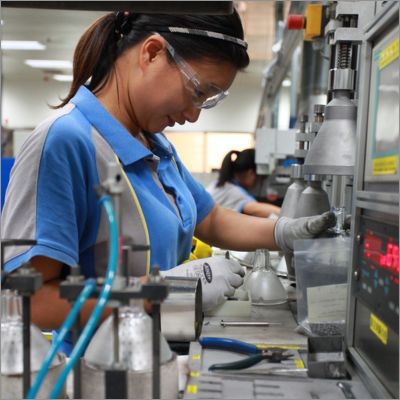A food manufacturing-specific Learning Management System (LMS) can turn the whole process of regulatory training and audit requirements into a very easy task.
The Role of LMS in Food Manufacturing
An LMS tailored for food manufacturing represents a digital platform aimed at providing, tracking, and managing training programs that are specific to the food sector. It enables the achievement of regulatory requirements in food safety, makes employee induction easy, and keeps employees updated with the latest knowledge through training in areas such as Hazard Analysis Critical Control Point (HACCP), Food Safety Management System (FSMS), and Good Manufacturing Practices (GMP).
Key Features of a Food Manufacturing LMS
- Regulatory Compliance:A comprehensive LMS would facilitate employee training through well-structured modules that comply with recognized standards like HACCP, FSMS, and FSSAI. This would ensure that workers familiarize themselves with the best food safety practices and regulatory needs, most up-to-date.
- Audit-Ready Documentation:Learning management systems keep track of the entire gamut for each employee's educational program: the dates of completion, the scores achieved in the assessments, and the certifications obtained. This unified documentation makes the audit process very quick, as it provides easy access to the training history and compliance records required by the auditors.
- Scalability and Flexibility:It is quite common for food processing plants to be spread out over several locations and have different shifts. An LMS facilitates broad-reaching training implementation, thus guaranteeing a standardized learning experience for all employees, whether they are in different places or have different working schedules.
- Real-Time Tracking and Reporting:Learning management systems offer real-time capability to track the progress of their employees; hence, managers can actively follow the completion of the training courses and also detect areas where employees require further assistance. The usage of automated reporting features will, without a doubt, considerably ease the work of compliance management.
- Cost-Effectiveness:Training costs can be kept at a minimum by the use of an LMS, which eliminates the need for face-to-face training sessions and the printing of hard copies of the training materials. Besides administrative tasks, once automated, we will be able to free up resources for other essential operations, which can be carried out simultaneously.
Benefits of Implementing an LMS in Food Manufacturing
The food service industry's success depends on consistency, safety, and customer satisfaction. Employee training is essential to the quality of service. Every employee needs to know their role. They need to keep up with the changing protocols and rules.
Compliance is a part of training. Food establishments must follow strict safety and labor requirements by regulatory agencies. Training shows these expectations are being met. This makes training and compliance more efficient, safer, and profitable.
1. Enhanced Food Safety Practices
Food safety practices that are well-aligned are necessary for the avoidance of foodborne illnesses and the maintenance of product quality. A training program delivered via an LMS ensures that the corporate social responsibility requirements (CSR) necessary to achieve a food-safe culture are met by the organization through the standardization of training in such topics as allergen control, sanitation procedures, and critical control points.
2. Improved Employee Performance
Personalized training modules address the unique requirements of different roles in the food manufacturing sector. In this manner, a Learning Management System provides targeted learning paths for a variety of roles, such as staff, supervisors, and quality assurance crew members, in order to enhance job performance and raise competency levels.
3. Streamlined Compliance Management
Compliance with regulations is an ongoing challenge that depends on constantly updated training and proper documentation. By installing an LMS, a company can guarantee that employees are timely informed of training related to new regulations and keep records properly for easy auditing, thus avoiding the risk of non-compliance penalties.
4. Increased Operational Efficiency
The introduction of an LMS simplifies the staff training program by employing the following features: automated reminders, progress tracking, and centralized reporting. Through these measures, employees are given opportunities to take full charge of their main responsibilities while administrative tasks are, on the other hand, relegated to a lesser extent.
Integrating LMS with Existing Systems
To utilize an LMS to its full capacity, the should be compatible with other enterprise systems such as Quality Management Systems (QMS) and Human Resources (HR) platforms. This connection is an open-door mechanism leading to a comprehensive approach towards management of compliance and the development of employees.
Choosing the Right LMS for Food Manufacturing
When selecting an LMS for food manufacturing, consider the following factors:
- Regulatory Alignment:The first step is to confirm whether the LMS provides a training module that meets the regulatory standards of food safety.
- User-Friendliness:The platform must be an intuitive one, and the employees should have no difficulty in using it.
- Customization Options:It is advisable to select an LMS that offers the possibility of creating a training program specific to the organization to meet the particular needs of the food company.
- Support and Training:It is always wise to have a strong customer support team and abundant training resources at your disposal when you select a provider to help you with the implementation and continuous use of your solution.
Conclusion
It is a wise decision to invest in an LMS specifically designed for food manufacturing, which will not only ensure the safety of the food and compliance with regulations but also enhance the company's operational efficiency. With the help of an LMS, which can deliver uniform, large-scale, and inspection-ready training programs, a food manufacturing company becomes strong enough to be able to handle the continuous changes in the regulatory requirements and, at the same time, maintain the highest levels of food safety.
FAQs
1. What is an LMS for food manufacturing?
An LMS (Learning Management System) for food manufacturing is a digital platform that delivers, tracks, and manages training programs specifically for the food industry. It facilitates compliance with food safety standards, organizes employee onboarding, and promotes continuous learning in such areas as HACCP, FSMS, and GMP.
2. How does a food safety LMS support regulatory compliance?
Food safety LMS maintains regulatory compliance by offering uniform training modules that adhere to industry regulations such as HACCP, FSMS, and FSSAI guidelines. The system ensures the timely delivery of training, tracks employee progress, and generates audit reports, thereby ensuring that all staff are conversant with the latest food safety practices.
- What are the benefits of using an LMS for HACCP training?
An LMS for HACCP training provides a platform for the training to be rolled out in a large group or various branch locations, the progress of learners can be followed in real-time, training materials are always readily available, and reporting is automated for audit purposes. The LMS is the perfect vehicle for communicating consistent and up-to-date training to the hazard analysis and critical control points.
- Can an LMS help during food safety audits?
Indeed, the use of an LMS in a food safety audit can be very beneficial as it is able to provide a central location where records of training, certificates, and compliance documents can all be stored in one place. Auditors thus have an easy time accessing and verifying employee training records, and in turn, making sure that the organization meets regulatory requirements and industry standards.
- Is it necessary to have an LMS for food manufacturing?
Not compulsory, nevertheless, it would be a great idea to have an LMS in place for food manufacturing. It makes the training tasks more efficient, guarantees the continuous compliance with the food safety regulations, lessens the possibility of human error, and increases the overall operational effectiveness.
Related Posts

24 October, 2025



